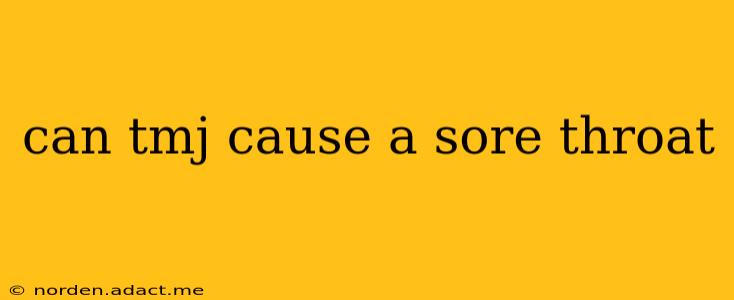Temporomandibular joint disorder (TMJ) is a condition affecting the jaw joint, causing pain and discomfort in the jaw, face, and surrounding areas. While the primary symptoms are localized to the jaw, many individuals report experiencing seemingly unrelated symptoms, including a sore throat. This raises the question: can TMJ actually cause a sore throat? The answer is complex and warrants a closer examination.
While TMJ doesn't directly cause a sore throat in the way a viral infection does, there's a strong correlation and several indirect pathways that can lead to throat pain in individuals with TMJ. Understanding these connections is crucial for accurate diagnosis and effective treatment.
How Can TMJ Lead to Throat Pain?
The link between TMJ and sore throat isn't always straightforward, but several mechanisms could explain the connection:
1. Muscle Tension and Referral Pain: TMJ often involves significant muscle tension in the jaw, neck, and shoulders. This tension can radiate pain to other areas, a phenomenon known as referred pain. The muscles of the throat and neck are interconnected, and chronic tension in the jaw muscles can easily trigger pain in the throat. Imagine the tight feeling you get in your neck and shoulders after a stressful day; this same tension can manifest as a sore throat in individuals with TMJ.
2. Jaw Misalignment and Postural Changes: TMJ can lead to misalignment of the jaw, impacting posture. Poor posture, in turn, can strain the muscles in the neck and throat, contributing to discomfort and pain. This chronic strain can lead to persistent sore throats.
3. Inflammation: The inflammation associated with TMJ can extend beyond the jaw joint itself. This inflammation could spread to surrounding tissues, potentially impacting the throat and causing soreness.
4. Grinding and Clenching (Bruxism): Many people with TMJ suffer from bruxism, the unconscious grinding or clenching of teeth. This constant muscle activity can exhaust the muscles, leading to referred pain in the throat and neck. The repetitive strain can also trigger inflammation.
5. Swallowing Difficulties: In severe cases of TMJ, jaw pain can make swallowing difficult or uncomfortable. This can lead to muscle strain in the throat and contribute to a feeling of soreness.
Can TMJ Cause a Sore Throat That Feels Like a Strep Throat?
This is a common concern. While TMJ-related throat pain can feel intense, it's crucial to differentiate it from strep throat or other infections. TMJ-related throat pain typically isn't accompanied by the other symptoms commonly associated with strep throat, such as fever, body aches, and white patches on the tonsils. However, if you experience a sore throat alongside jaw pain and other TMJ symptoms, it's essential to consult a doctor or dentist to rule out any underlying infection.
What if I Have a Sore Throat and Suspect TMJ?
If you experience a persistent sore throat coupled with jaw pain, clicking or popping in the jaw, headaches, and earaches, it’s vital to seek professional help. A dentist specializing in TMJ disorders or an oral surgeon can properly diagnose the condition and recommend appropriate treatment.
How is TMJ Diagnosed?
Diagnosis usually involves a thorough physical examination of the jaw joint and surrounding muscles, often including palpation (feeling the muscles for tenderness) and range-of-motion assessment. X-rays or other imaging techniques might be used to visualize the joint structure.
What are the Treatment Options for TMJ?
Treatment options for TMJ vary depending on the severity of the condition. They can range from simple self-care measures like stress reduction techniques and over-the-counter pain relievers to more complex interventions, such as mouthguards, physical therapy, or in some cases, surgery.
Can TMJ Be Prevented?
While not all cases of TMJ are preventable, you can reduce your risk by practicing good oral hygiene, avoiding excessive chewing gum, managing stress effectively, and maintaining a healthy posture.
This information is for educational purposes only and does not constitute medical advice. Always consult with a healthcare professional for any health concerns or before making any decisions related to your health or treatment.
